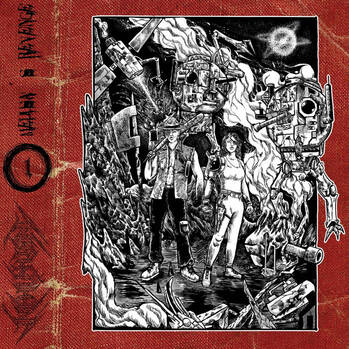
Written by: The Administrator
The term “post-apocalyptic,” as a descriptor, has always felt somewhat universal--a quality that is most likely a direct result of the extensive post-apocalyptic media that I grew up with. While the narratives and backdrops differ, there’s a commonality in depictions of the world after the end of the world. Barren, expansive, utilitarian, hodge-podge, cruel, mysterious, no-nonsense. Antiquated in a vaguely otherworldly sense. On Book 1: Medusa’s Revenge, blackened sludge duo Nehushtan have managed to apply that distinct aesthetic to the aural form in a wholly engrossing fashion. As such, much like the world their extensive narrative exists within, this album feels both intrinsically tough and enticingly uncharted.
While Nehushtan feel wholly unique in their niche, they wear their influences on their sleeves, both musical and thematic. Citing the Fallout series and King’s The Dark Tower, as well as belov'd bands from both the black metal and sludge camps--Baroness, Mastodon, Hoth, Enslaved, etc.--Nehushtan are a prime example of a band that demonstrates a dedication to influences without seeming overly informed or dictated by them. Their sound and approach feels pretty damn distinct, and that facet alone serves as a strong draw. In an era where new music is constantly thrust upon us, spending an hour (give or take) with something that feels entirely fresh and exciting is...well, fresh and exciting. Even diving into the storyline and worldbuilding is an adventure: I’ll direct you to the bandcamp description for details, but in brief, this album takes the audience to the fictional Land of Nod, circa 2108, where the narrative follows a nonbinary serpent healer who is seeking vengeance on the Serpent Eagles, and an orphaned scavenger looking for his place in the lonely waste. A strong concept album depends on a strong plot and cast of characters, and, frankly, much like everything contained herein, Nehushtan are very well equipped for the task at hand.
While the instrumentation on Book 1: Medusa’s Revenge is strong across the board--more on that later--one of the most intriguing aspects of Nehushtan are Espi Kvlt’s vocals. Primarily delivering a dry monotonal drawl, their performance is unsettling in a fascinating sense. Abrasive and raw, yet measured and deliberate. Unfamiliar in a fashion that is initially uncomfortable, yet simultaneously alluring. The haunting cleans have a similar quality, and the screams--look to “Spectral Forest Part 3” for a particularly prominent example--are alarming without feeling ungrounded. Listening to Espi reminds me of what it felt like to encounter harsh vocals for the first time. It’s difficult to describe, but, rest assured, is a singularly absorbing experience. The vocals sit comfortably in the mix, never too forward or too distant. While I can imagine that a listener expecting more commonplace blackened shrieks or sludgy bellows may need a little time to become acquainted with the vocal styles on display, I wholeheartedly recommend taking the time to do so. From a songwriting perspective, Nehushtan keep things pretty interesting, with a variety of slower and faster passages to flesh out the general mid-tempo pace of intrinsically sludgy music. Chris H’s guitar across the board is stellar, featuring a tone that is consistently present without feeling dense, and a very nice sense of forward momentum rearing its head during the more frenetic bits. While sludgy riffs--borderline doomy, in the case of tracks such as “The Tip of Heaven”--and tremolos aplenty serve as Nehushtan’s bread and butter, a crisper sound that approaches a trad metal gallop occasionally flares up. See, for example, the barn-burning “Serpent Eagle’s Camp,” which adds a little drama and swashbuckling adventure to the album’s back half. In sum, the guitar’s presence is powerful without being overbearing, and, on the other end of the spectrum, avoids the black metal trap of an application so thin that one needs to strain to hear what the hell is going on. In terms of maintaining a certain intrigue, the use of harp is a smart choice, as it adds a uniquely vibrant element without forcing itself into the limelight. Also of note are the programmed drums, which are pretty organically applied. All told, a job well done. Book 1: Medusa’s Revenge is a grower--but not on the basis that the first few listens aren’t enjoyable. Rather, the more time you spend with this album, the more you are able to glean, and the more real the world feels. Any album that continually pulls me back in is a winner in my book...and any album that manages top do so while simultaneously shaking up my expectations of the genre(s) at hand might as well just take home the entire case of trophies. In the album description, the duo mentions that they are, to quote, “both extremely proud of the result." I can certainly see why. Book 1: Medusa’s Revenge is an absolute monster of a debut effort, from a technical, thematic, narrative, and aesthetic standpoint. If this is what Nehushtan are able to achieve on their first outing, I shudder/shiver to consider what Book 2 will deliver. Needless to say, Book 1: Medusa’s Revenge is A. highly recommended and B. well worth your while. Give it a listen here, and consider snagging one of those cassettes while you’re in the neighborhood. Nehushtan - Book 1: Medusa’s Revenge was released May 7th, 2021 from Trepanation Recordings.
0 Comments
Leave a Reply. |
Welcome!
We provide thoughtful reviews of music that is heavy, gloomy...and loud enough to wake us from slumber. Written by a highfalutin peasantry!
|
 RSS Feed
RSS Feed